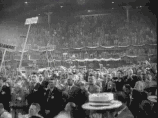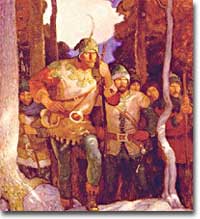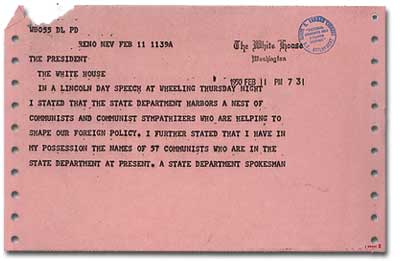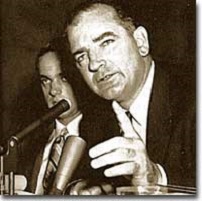53a. McCarthyism

"Our job as Americans and as Republicans is to dislodge the traitors from every place where they've been sent to do their traitorous work." -Joseph McCarthy, speech before the Republican National Convention (1952)
"Are you now, or have you ever been, a member of the Communist party?"
In the 1950s, thousands of Americans who toiled in the government, served in the army, worked in the movie industry, or came from various walks of life had to answer that question before a congressional panel.
Senator Joseph McCarthy rose to national prominence by initiating a probe to ferret out communists holding prominent positions. During his investigations, safeguards promised by the Constitution were trampled.
Why were so many held in thrall to the Wisconsin lawmaker? Why was an environment that some likened to the Salem witch trials tolerated?

Fears that children would be corrupted by the "communist" practices depicted in Robin Hood led many schools and libraries to ban the classic tale about taking from the rich to give to the poor.
The Atomic Era
In 1947, President Truman had ordered background checks of every civilian in service to the government. When Alger Hiss, a high-ranking State Department official was convicted on espionage charges, fear of communists intensified.
McCarthy capitalized on national paranoia by proclaiming that communist spies were omnipresent and that he was America's only salvation.
An atmosphere of fear of world domination by communists hung over America in the postwar years. There were fears of a nuclear holocaust based on the knowledge that the Soviet Union exploded its first A-bomb in 1949. That same year, China, the world's most populous nation, became communist. Half of Europe was under Joseph Stalin's influence, and every time Americans read their newspapers there seemed to be a new atomic threat.

Senator Joseph McCarthy sent this telegram to President Truman two days after claiming that he had identified "205 card-carrying" members of the Communist party working in the U.S. State Department.
At a speech in Wheeling, West Virginia, on February 9, 1950, McCarthy launched his first salvo. He proclaimed that he was aware of 205 card-carrying members of the Communist Party who worked for the United States Department of State. A few days later, he repeated the charges at a speech in Salt Lake City. McCarthy soon began to attract headlines, and the Senate asked him to make his case.
McCarthy's Wheeling Speech

Senator Joe McCarthy and chief counsel Roy Cohn interrogating suspected communists.
At a speech in Wheeling, West Virginia, on February 9, 1950, McCarthy proclaimed that he was aware of 205 card-carrying members of the Communist Party who worked for the United States Department of State. This speech set off an era of paranoia and accusation and propelled McCarthy into the national spotlight.
Ladies and gentlemen, tonight as we celebrate the one hundred and forty-first birthday of one of the greatest men in American history, I would like to be able to talk about what a glorious day today is in the history of the world. As we celebrate the birth of this man who with his whole heart and soul hated war, I would like to be able to speak of peace in our time, of war being outlawed, and of worldwide disarmament. These would be truly appropriate things to be able to mention as we celebrate the birthday of Abraham Lincoln ....
Five years after a world war has been won, men's hearts should anticipate a long peace, and men's minds should be free from the heavy weight that comes with war. But this is not such a period--for this is not a period of peace. This is a time of the "Cold War." This is a time when all the world is split into two vast, increasingly hostile armed camps--a time of great armaments race ...
Six years ago, at the time of the first conference to map out the peace — Dumbarton Oaks — there was within the Soviet orbit 180,000,000 people. Lined up on the antitotalitarian side there were in the world at that time roughly 1,625,000,000 people. Today, only 6 years later, there are 800,000,000 people under the absolute domination of Soviet Russia--an increase of over 400 percent. On our side, the figure has shrunk to around 500,000,000. In other words, in less than 6 years the odds have changed from 9 to 1 in our favor to 8 to 5 against us. This indicates the swiftness of the tempo of Communist victories and American defeats in the cold war. As one of our outstanding historical figures once said, "When a great democracy is destroyed, it will not be because of enemies from without, but rather because of enemies from within."
The truth of this statement is becoming terrifyingly clear as we see this country each day losing on every front.
At war's end, we were physically the strongest nation on earth and, at least potentially, the most powerful intellectually and morally. Ours could have been the honor of being a beacon on the desert of destruction, a shining living proof that civilization was not yet ready to destroy itself. Unfortunately, we have failed miserably and tragically to arise to the opportunity.
The reason why we find ourselves in a position of impotency is not because our only powerful potential enemy has sent men to invade our shores, but rather because of the traitorous actions of those who have been treated so well by this Nation. It has not been the less fortunate or members of minority groups who have been selling this Nation out, but rather those who have had all the benefits that the wealthiest nation on earth has had to offer--the finest homes, the finest college education, and the finest jobs in Government we can give.
This is glaringly true in the State Department. There the bright young men who are born with silver spoons in their mouths are the ones who have been the worst ...
Now I know it is very easy for anyone to condemn a particular bureau or department in general terms. Therefore, I would like to cite one rather unusual case--the case of a man who has done much to shape our foreign policy.
When Chiang Kai-shek was fighting our war, the State Department had in China a young man named John S. Service. His task, obviously, was not to work for the communization of China. Strangely, however, he sent official reports back to the State Department urging that we torpedo our ally Chiang Kai-shek and stating, in effect, that communism was the best hope of China.
Later, this man — John Service — was picked up by the Federal Bureau of Investigation for turning over to the communists Secret state Department information. Strangely, however, he was never prosecuted. However, Joseph Grew, the Undersecretary of State, who insisted on his prosecution, was forced to resign. Two days after Grew's successor, Dean Acheson, took over as Undersecretary of State, this man — John Service — who had been picked up by the FBI and who had previously urged that communism was the best hope of China, was not only reinstated in the State Department but promoted. And finally, under Acheson, placed in charge of all placements and promotions.
Today, ladies and gentlemen, this man Service is on his way to represent the State Department and Acheson in Calcutta — by far and away the most important listening post in the Far East ...
Then there was a Mrs. Mary Jane Kenny, from the Board of Economic Warfare in the State Department, who was named in an FBI report and in a House committee report as a courier for the Communist Party while working for the Government. And where do you think Mrs. Kenny is — she is now an editor in the United Nations Document Bureau ...
This, ladies and gentlemen, gives you somewhat of a picture of the type of individuals who have been helping to shape our foreign policy. In my opinion the State Department, which is one of the most important government departments, is thoroughly infested with Communists.
I have in my hand 57 cases of individuals who would appear to be either card carrying members or certainly loyal to the Communist Party, but who nevertheless are still helping to shape our foreign policy ...
This brings us down to the case of one Alger Hiss who is more important not as an individual any more, but rather because he is so representative of a group in the State Department ...
If time permitted, it might be well to go into detail about the fact that Hiss was Roosevelt's chief advisor at Yalta when Roosevelt was admittedly in ill health and tired physically and mentally ...
According to the then Secretary of State Stettinius, here are some of the things that Hiss helped to decide at Yalta. (1) The establishment of a European High Commission; (2) the treatment of Germany — this you will recall was the conference at which it was decided that we would occupy Berlin with Russia occupying an area completely circling the city, which, as you know, resulted in the Berlin airlift which cost 31 American lives; (3) the Polish question; ... (6) Iran; (7) China — here's where we gave away Manchuria; (8) Turkish Straits question; (9) international trusteeships; (10) Korea....
I know that you are saying to yourself, "Well, why doesn't the Congress do something about it?" Actually, ladies and gentlemen, one of the important reasons for the graft, the corruption, the dishonesty, the disloyalty, the treason in high Government positions--one of the most important reasons why this continues is a lack of moral uprising on the part of the 140,000,000 American people. In the light of history, however, this is not hard to explain.
It is the result of an emotional hang-over and a temporary moral lapse which follows every war. It is the apathy of evil which people who have been subjected to the tremendous evils of war feel. As the people of the world see mass murder, the destruction of defenseless and innocent people, and all of the crime and lack of morals which go with war, they become numb and apathetic. It has always been thus after war.
However, the morals of our people have not been destroyed. They still exist. This cloak of numbness and apathy has only needed a spark to rekindle them. Happily, this spark has finally been supplied.
As you know, very recently the Secretary of State proclaimed his loyalty to a man [Hiss] guilty of what has always been considered as the most abominable of all crime — of being a traitor to the people who gave him a position of great trust. The Secretary of State in attempting to justify his continued devotion to the man who sold out the Christian world to the atheistic world, referred to Christ's Sermon on the Mount as a justification and reason therefore, and the reaction of the American people to this would have made the heart of Abraham Lincoln happy.
When this pompous diplomat in striped pants, with a phony British accent, proclaimed to the American people that Christ on the Mount endorsed communism, high treason, and betrayal of a sacred trust, the blasphemy was so great that it awakened the dormant indignation of the American people.
He has lighted the spark which is resulting in a moral uprising and will end only when the whole sorry mess of twisted, warped thinkers are swept from the national scene so that we may have a new birth of national honesty and decency in government.
On February 20, 1950, McCarthy addressed the Senate and made a list of dubious claims against suspected communists. He cited 81 cases that day. He skipped several numbers, and for some cases repeated the same flimsy information. He proved nothing, but the Senate called for a full investigation. McCarthy was in the national spotlight.
Staying in the headlines was a full-time job. After accusing low-level officials, McCarthy went for the big guns, even questioning the loyalty of Dean Acheson and George Marshall. Some Republicans in the Senate were aghast and disavowed McCarthy.
Others such as Robert Taft and Richard Nixon, saw him as an asset. The public rewarded the witch-hunters by sending red-baiters (communist accusers) before the Senate and the House in 1950.
"Tail Gunner Joe" Shot Down
When Dwight Eisenhower became president, he had no love for McCarthy. Ike was reluctant to condemn McCarthy for fear of splitting the Republican Party. McCarthy's accusations went on into 1954, when the Wisconsin senator focused on the United States Army. For eight weeks, in televised hearings, McCarthy interrogated army officials, including many decorated war heroes.
But this was his tragic mistake. Television illustrated the mean-spiritedness of McCarthy's campaign. The army then went on the attack, questioning McCarthy's methods and credibility. In one memorable fusillade, the Council for the Army simply asked McCarthy, "At long last, have you no sense of decency left?"
Poll after poll showed the American people thought McCarthy unscrupulous in his attack of the army.
Fed up, McCarthy's colleagues censured him for dishonoring the Senate, and the hearings came to a close. Plagued with poor health and alcoholism, McCarthy himself died three years later.
Blacklisting

After being blacklisted, Dalton Trumbo, screenwriter and member of the Hollywood Ten, was forced to use false names to continue writing. In 1956, he won an Oscar for The Brave One under the name Robert Rich. It wasn't until 1960 that he could use his real name in Hollywood again.
McCarthy was not the only individual to seek out potential communists.
The House Committee on Un-American Activities (HUAC) targeted the Hollywood film industry. Actors, writers, and producers alike were summoned to appear before the committee and provide names of colleagues who may have been members of the Communist Party.
Those who repented and named names of suspected communists were allowed to return to business as usual. Those who refused to address the committee were cited for contempt. Uncooperative artists were blacklisted from jobs in the entertainment industry. Years passed until many had their reputations restored.
|
Sir, I detest, I abhor their [communists'] philosophy, but I detest more than that their tactics, which are those of the fifth column, and are dishonest, but at the same time I never as a citizen want to see our country become urged, by either fear or resentment of this group, that we ever compromise with any of our democratic principles through that fear or resentment. I still think that democracy can do it. – Ronald Reagan, testifying in front of the HUAC as president of the Screen Actors Guild (1947) | ||
Were there in fact communists in America?
The answer is undoubtedly yes. But many of the accused had attended party rallies 15 or more years before the hearings — it had been fashionable to do so in the 1930s.
Although the Soviet spy ring did penetrate the highest levels of the American government, the vast majority of the accused were innocent victims. All across America, state legislatures and school boards mimicked McCarthy and HUAC. Thousands of people lost their jobs and had their reputations tarnished.
Other Witch-Hunt Victims
Unions were special target of communist hunters. Sensing an unfavorable environment, the AFL (American Federation of Labor) and the CIO (Congress of Industrial Organizations) merged in 1955 to close ranks. Books were pulled from library shelves, including Robin Hood, which was deemed communist-like for suggesting stealing from the rich to give to the poor.
No politician could consider opening trade with China or withdrawing from Southeast Asia without being branded a communist. Although McCarthyism was dead by the mid-1950s, its effects lasted for decades.
Above all, several messages became crystal clear to the average American: Don't criticize the United States. Don't be different. Just conform.








